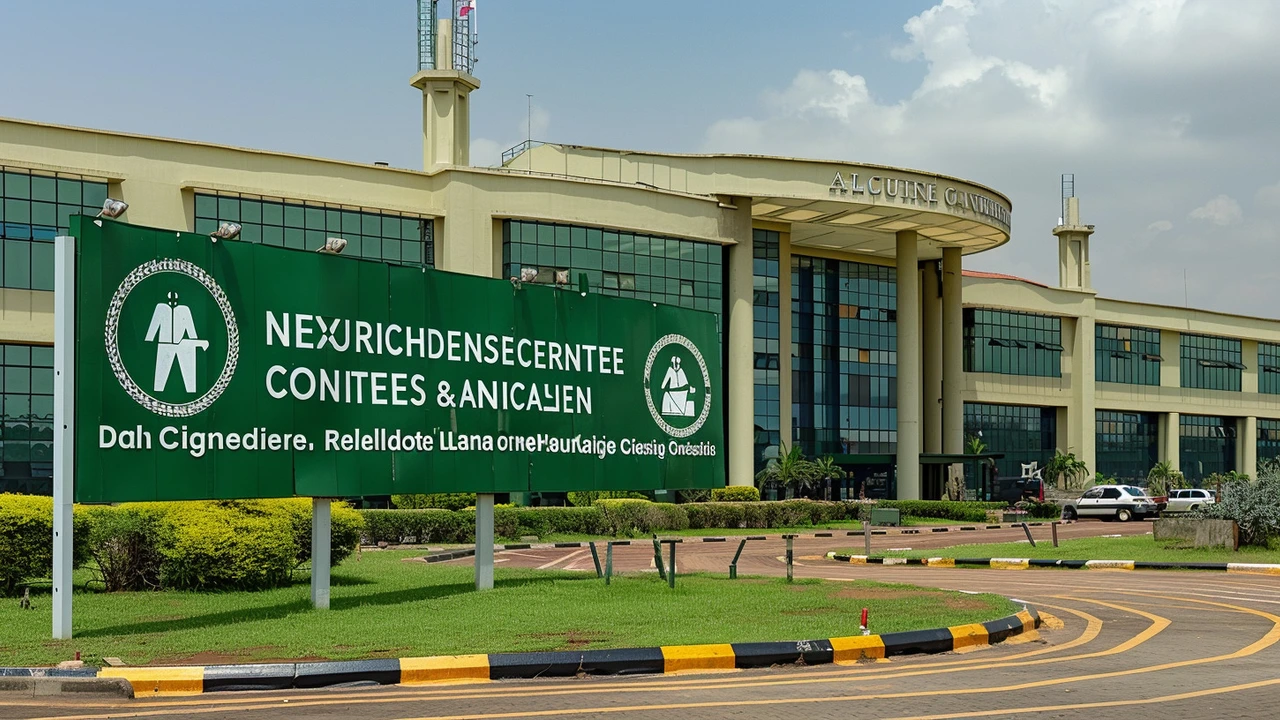Nigeria Faces Alarming Cholera Outbreak: NCDC Reports 30 Fatalities
The Nigeria Centre for Disease Control and Prevention (NCDC) has sounded the alarm over a disturbing rise in cholera cases across the country, particularly as the nation grapples with the onset of the rainy season. As of June 11, the NCDC reported 65 confirmed cases of cholera, resulting in 30 deaths. The disease has had a wide-reaching impact, with 1,141 suspected cases being reported across 96 local government areas in 30 states, painting a grim picture of the current public health landscape in Nigeria.
Cholera, a highly contagious disease, is primarily spread through contaminated food and water. Poor sanitation is a significant contributing factor to its spread. The symptoms include the sudden onset of watery diarrhea, vomiting, and fever. In severe cases, cholera can lead to death due to rapid dehydration, underscoring the need for immediate medical attention and intervention.

Impact on States
The strength of the cholera outbreak is particularly pronounced in ten states: Bayelsa, Zamfara, Abia, Cross River, Bauchi, Delta, Katsina, Imo, Nasarawa, and Lagos, which together account for 90% of the total cases. Lagos State, in particular, has seen a recent spike in cases, with around 60 people admitted to the hospital and five deaths occurring within a mere 48-hour period. This rapid spread of the disease within such a short timeframe has raised considerable public health concerns.
Tackling the Outbreak
The NCDC has ramped up its efforts to mitigate the spread of cholera. Critical advice has been given to the public to ensure access to safe drinking water, proper sanitation, and good hygiene practices—key measures in preventing the disease. The focus on clean water cannot be overstated, given that cholera thrives in environments where water safety is compromised.
Health workers have been urged to strictly adhere to standard safety precautions in their treatment of patients. Moreover, the NCDC has set in motion a multi-sectoral National Cholera Technical Working Group. This collaborative effort includes the Federal Ministries of Environment and Water Resources, the National Primary Health Care Development Agency, the World Health Organization (WHO), the United Nations Children's Fund (UNICEF), and other critical health partners.
The objective of this group is to harness resources and expertise to promptly respond to and manage the outbreak. By drawing on the collective experiences and capabilities of these organizations, the working group aims to curb the widespread impact of cholera and save lives.
Preventive Measures and Public Advisory
To further curb the spread of cholera, the NCDC has provided several key guidelines. The public is strongly advised to ensure that their drinking water is safe by boiling water before use or treating it with chlorine. Proper sanitation practices, such as ensuring that human waste is disposed of in pit latrines or toilets, and maintaining clean household environments, including the disinfection of surfaces, are crucial steps in preventing the contamination that leads to cholera.
Good personal hygiene is essential. Regular handwashing with soap and clean water, especially before meals and after using the restroom, helps reduce the risk of infection. In communities, the maintenance of clean public spaces and facilities, alongside the provision of safe food handling and preparation practices, play significant roles in minimizing the risk of an outbreak.
Emergency Response and Support
In response to this public health crisis, the NCDC, along with the National Cholera Technical Working Group, has been active on the ground, providing much-needed support to affected states. This includes supplying rehydration solutions and antibiotics, which are critical in the treatment of cholera. By ensuring that these resources are readily available, the NCDC aims to offer timely and effective treatment to those affected.
The public health advisory also underscores the importance of early detection and treatment. Individuals experiencing symptoms of cholera are advised to seek immediate medical attention. The early administration of oral rehydration solutions and antibiotics has proven effective in treating the disease, significantly reducing the risk of fatality.
Additionally, the NCDC's awareness campaigns have been instrumental in educating the public about the symptoms of cholera, preventive measures, and the importance of seeking prompt medical care.
The Role of International Partners
The task force's collaborative approach leverages the expertise and resources of international partners such as WHO and UNICEF. These organizations provide critical support through funding, logistical aid, and the provision of medical supplies. Their involvement is vital in complementing the NCDC's efforts and ensuring a comprehensive response to the outbreak.
The involvement of international partners also brings a wealth of experience in managing similar outbreaks globally, offering best practices and innovative solutions to help mitigate the impact of cholera in Nigeria.
In conclusion, while Nigeria grapples with a rising cholera outbreak amid the rainy season, the concerted efforts of the NCDC, local health authorities, and international partners provide a beacon of hope. The emphasis on improved sanitation, access to clean drinking water, and good hygiene practices are critical in winning the fight against cholera. Awareness, early detection, and timely medical intervention remain key strategies in reducing the disease's toll and preventing further loss of life.


Nancy Perez de Lezama
While the NCDC’s alert is clearly important, it’s also a reminder that basic water safety measures should already be a part of daily life, especially during the rainy season.
Matt Heitz
The epidemiological trajectory of this cholera surge illustrates a systemic failure in public health governance, a glaring neglect of fiduciary duty that compromises national biosecurity; such dereliction demands immediate policy recalibration and stringent enforcement of sanitary protocols.
Susan Mark
From a practical standpoint, ensuring that households have access to chlorine tablets and promoting regular hand‑washing with soap can drastically cut transmission rates; community health workers should also distribute oral rehydration salts and conduct brief training sessions on proper waste disposal.
Jason Jennings
Honestly, the media hype around this outbreak feels overblown when you consider that cholera has been a recurring issue for decades, and yet we keep applauding the same half‑hearted interventions.
Diego Vargas
U dont need to reinvent the wheel-just implement proven water chlorination protocols and ensure latrine maintenance, and the case numbers will drop dramatically, as history has shown in similar outbreaks across sub‑Saharan regions.
Alex Lee
People keep overreacting.
James Lawyer
It is essential to balance urgent response measures with respect for local customs, ensuring that outreach programs are culturally sensitive while maintaining rigorous scientific standards.
Vida Yamini
First and foremost, let’s acknowledge the tremendous effort that the NCDC and its partners have poured into tackling this public health crisis; their dedication serves as a beacon of hope for countless communities facing the same threats. The importance of safe drinking water cannot be overstated, and ensuring that households have reliable methods for purification, such as boiling or chlorination, is a cornerstone of disease prevention. Equally critical is the role of sanitation infrastructure, which must be upgraded to prevent the contamination of water sources that fuels cholera transmission. Community education campaigns, when delivered with empathy and cultural relevance, empower individuals to adopt hygiene practices that protect both themselves and their families. Moreover, regular training for health workers on the correct administration of oral rehydration solutions can dramatically reduce mortality rates. Collaboration between governmental agencies, NGOs, and international bodies like WHO and UNICEF brings together a wealth of expertise and resources, creating a synergistic response that far exceeds the capacity of any single entity. It is also vital to monitor disease trends in real time, using data analytics to anticipate hotspots and allocate supplies efficiently. Engaging local leaders and religious figures can amplify the reach of preventive messages, fostering trust and compliance within the population. Investing in portable water treatment units for remote areas ensures that even the most isolated communities receive vital protection. The distribution of rehydration salts should be accompanied by clear instructions, as misuse can undermine the therapeutic benefits. Furthermore, maintaining a robust supply chain for antibiotics and other essential medicines guarantees that patients receive timely, effective care. Continuous public awareness campaigns, leveraging radio, television, and social media, keep the conversation alive and reinforce key preventive behaviors. By addressing the underlying determinants of health-such as poverty, education, and access to services-we lay the foundation for long‑term resilience against cholera and other water‑borne diseases. In summary, this multifaceted approach, grounded in science, community participation, and sustained political will, offers the best chance to curb the outbreak and safeguard lives. Let us all, in our respective capacities, support these initiatives and champion the cause of clean water for every Nigerian.